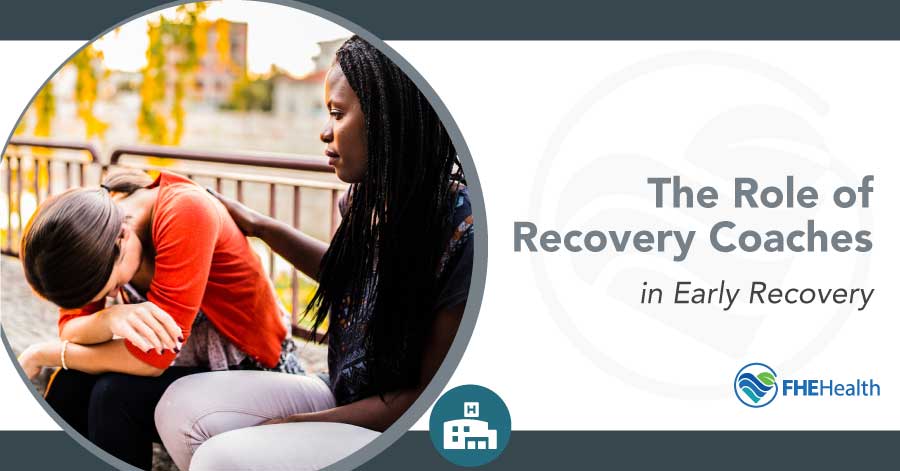
Giving up drugs and alcohol and committing to a rehab program is hard work, and it requires bravery and commitment — but life after rehab can be even more challenging for former addicts. It can be tough to adjust to post-recovery life and avoid temptations, especially during early recovery. A recovery coach can help in many ways, and the support they provide can be a valuable early recovery tool.
Keep reading to learn more about why having a peer recovery coach is recommended for individuals who’ve recently completed rehab and whether this may be a good option for you.
What Is a Recovery Coach?
A recovery coach is someone who provides support and guidance to individuals who are in recovery. Recovery coaches are becoming more common as post-recovery support resources expand. It can be challenging to commit to a life of recovery when you have little or no support. According to a study referenced in The Journal of the American Medical Association, 40-60% of addicts who seek rehab treatment end up relapsing within one year. This shows that having a strong support system is critical.
Recovery coaches can help limit the likelihood of relapse by providing support and guidance during challenging times and when an individual hits a recovery roadblock. A recovery coach may be a licensed therapist or a trusted friend who helps you stay accountable. Some coaches may also be in recovery themselves.
Another study found that homeless veterans who struggled with substance abuse and committed to chronic care management, including psychotherapy and recovery coaching, improved their length of abstinence at their six-month follow-up appointments. This helps to highlight the importance of recovery coaching during the recovery process.
What Services Can a Peer Recovery Coach Offer?
You may be wondering what does a recovery coach do? Not all recovery coaches offer the same services, but they all share the goal of wanting to help others on their recovery journey. Here are some services a recovery coach can provide:
- Being there to listen and to talk as challenges arise
- Helping an individual develop new patterns of behavior and habits that will be beneficial to recovery
- Reminding an individual that they’re not alone and that they can reach their recovery goals
- Holding the individual accountable for their actions and behaviors so that they stay on track
- Finding additional support resources and programs that can help an individual be more successful on their road to recovery
- Being there to work through the emotional and psychological challenges that come up during recovery
- Helping an individual avoid negative influences and past addictive behaviors
- Attending meetings, medical appointments or recovery programs together
- Reducing the likelihood of relapses by being a go-to contact who’s available for phone calls, texts and in-person discussions when a person experiences urges or cravings
- Helping an individual feel less alone on this new journey
As you can see, there are many ways in which a peer recovery roach can be helpful. Without a recovery coach or a strong support system, it can be easier for former addicts to stray and give up on their drug and alcohol recovery goals. It’s much easier to do anything in life with support, and recovery coaches provide a wide range of support.
Are Recovery Coaches Legit?
Yes, recovery coaches are legit — both professional, licensed individuals and nonprofessionals alike. But, as with any industry that has limited regulations in place, it’s a smart idea to do your research and make sure you choose someone honest, reliable and legitimate.
To better vet a coach, it’s a good idea to hire them well before you find yourself in a crisis. That’s why it can be beneficial to find a recovery coach before you finish completing your rehab program or find someone as soon as you get out of rehab. That way, you have time to develop a relationship with your coach before finding yourself in a tough spot.
If you’re unsure where to start when hiring a peer recovery coach, you can reach out to a substance abuse and mental health treatment organization and they can help you find someone legitimate.
Should You Hire a Peer Recovery Coach?
So many people benefit from recovery coaching. You may be wondering if this is something that’s a good investment and tool for you. If you’re about to head into treatment or have just completed rehab, hiring a recovery coach can be an extremely smart idea.
You may think you can get through your recovery journey alone, but it’s better to surround yourself with supportive resources, especially during the first weeks and months of recovery. You never know when you may need someone to lean on or talk to about your worries or recovery struggles.
When you have a peer recovery coach on your side, it can be easier to get through recovery-related challenges. Do your research and look into options. If you’re not ready or can’t commit to a professional coach, consider asking a trusted loved one or friend to serve as your coach.
Some individuals don’t like having a recovery coach or find that it’s not for them. While recovery coaches may not work well for everyone, it’s worthwhile to try. A recovery coach alone is usually not the solution. Many former addicts also find that hanging out with friends who are a good influence and attending recovery meetings help them stay on track.
Set Yourself up for Success
It’s important to remember that while recovery coaches can be a valuable tool, they’re not a replacement for medical detox or drug and alcohol rehabilitation programs. If you need help quitting drugs or alcohol for good and have yet to complete a rehab program, FHE Health is ready to help. Give us a call at (833) 596-3502. We have compassionate counselors available 24/7, and they can help you stop using drugs or alcohol in a safe way.






